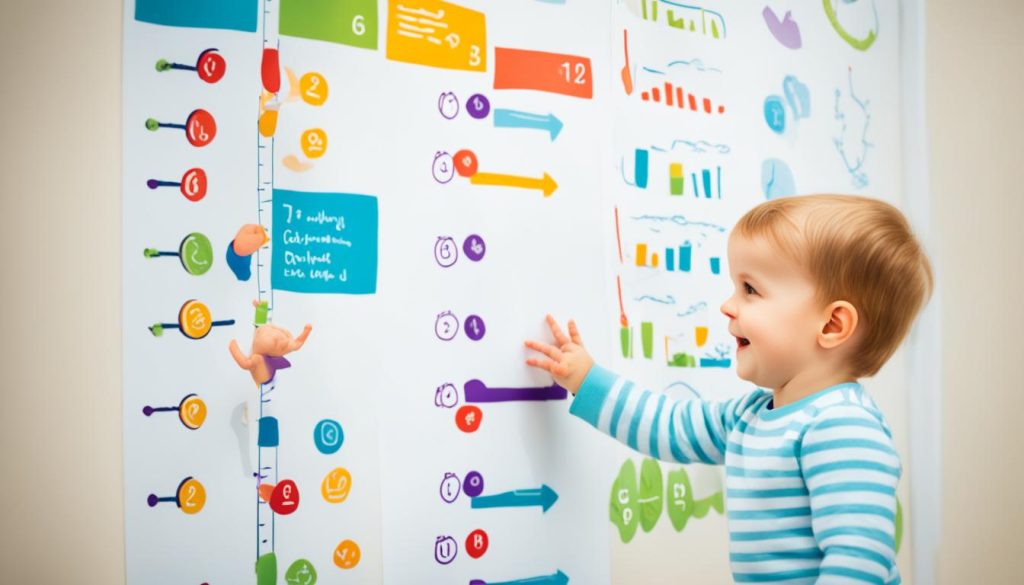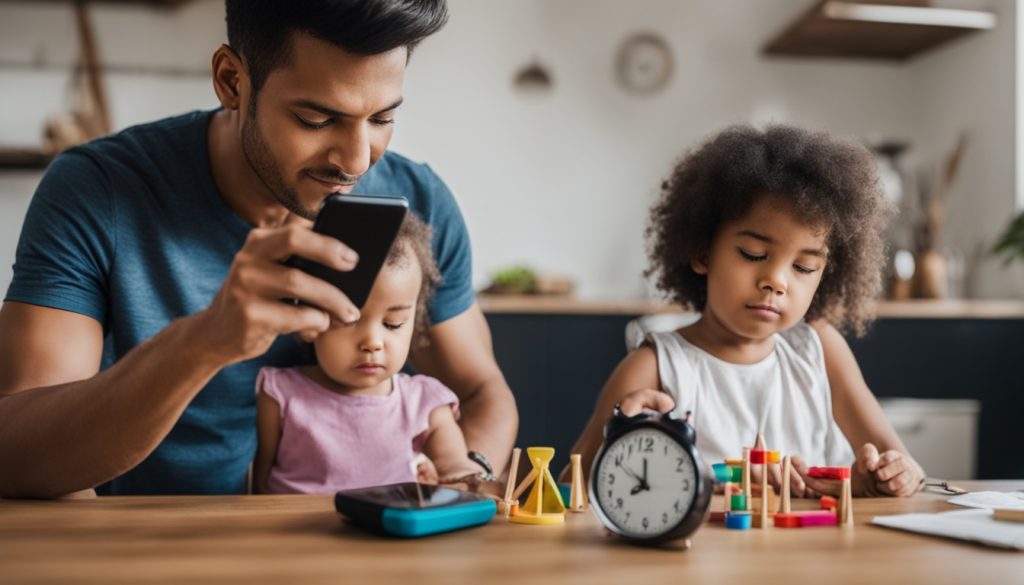Imagine coming home to find your family staring at their screens. This is a common sight today, where digital devices are a big part of our lives. As a parent, finding a balance is key. With the ups and downs of Parenting in the Digital Age, managing screen time is vital. How do you make sure you spend quality time with your family while dealing with digital life?
Screens are hard to put down for both kids and adults. Research says kids 6 to 18 should have only 1-2 hours of screen time daily. But for many, sticking to this rule is tough. You might be concerned about how screens affect your child’s health, mind, and social skills.
But, finding a balance between screen time and family time is doable. Setting screen-free times for family activities, encouraging outdoor play, and talking openly about screen limits can help. Research shows 86% of families with good digital habits use tech to bring them closer. So, even though screens are here to stay, managing their use well can help Strengthen Parent-Child Bond.
Key Takeaways
- Children aged 6 to 18 are recommended to have no more than 1-2 hours of recreational screen time per day.
- Implementing screen-free hours for family bonding activities helps reduce screen dependence.
- Avoiding screens in the child’s bedroom, particularly before bedtime, can help improve sleep patterns.
- Using screen time as a reward for completing tasks teaches children about time management and responsibility.
- Maintaining open communication with children about screen time limits is crucial for establishing a healthy balance.
Understanding the Impact of Screen Time on Child Development
In today’s world, it’s key for parents and teachers to know how screen time affects kids. Knowing this helps support their mental health and social skills.

Physical Health
Too much screen time can harm kids’ physical health. Research shows it can lead to obesity and mess with sleep patterns. This is backed by studies from 2015.
Experts say it’s vital to limit screen time for kids’ health.
Mental Health
Too much screen time can hurt kids’ mental health. Studies link it to issues like trouble focusing, being more aggressive, and poor decision-making.
It’s important to keep screen time in check for kids’ mental well-being.
Social Skills
Screen time can also hurt kids’ social skills. Kids need real-life interactions to grow and learn. Studies show too much screen time can slow down language and social skills.
To boost social skills, it’s best to encourage face-to-face interactions over digital ones.
Overall, finding a good balance with screen time is key for kids’ growth. It helps with both physical and mental health, and supports social skills.
Establishing Screen Time Limits: A Step-by-Step Guide
Setting clear screen time limits is key to managing kids’ digital use well. Using step-by-step strategies makes this easier and helps your family have a balanced digital life. This guide will show you how to set limits while teaching kids responsibility, handling conflicts, and using effective discipline strategies.
- Understand the Recommendations: The American Academy of Pediatrics suggests no screen time for kids under two years old, except for FaceTiming with family.
- Create a Schedule: Set specific times for screen use to help kids know what to expect and reduce fights. This method makes screen time structured and helps with sibling rivalry.

- Use Incentives: Rewarding good behavior with more screen time works well. Explain how they can earn extra time to teach responsibility.
- Start Fresh: Dr. Anderson suggests starting new screen time rules during other changes for better acceptance by kids.
- Avoid Debates: Having clear rules and avoiding debates is more effective. Being consistent in enforcing rules helps kids understand and accept limits.
- Trial Periods: Try out new rules for a while to see how they work and make any needed changes.
- Expect Resistance: Kids might not like new rules at first, but being consistent and not making exceptions can help them accept them in a week or two.
Setting screen time limits can also be done by making family rules and using screen time as a reward. Here’s a detailed comparison to show different policies:
| Screen Time Limitations | Details |
|---|---|
| Bedtime Rules | Set bedtimes through talking with kids to balance their needs and screen use. |
| Device-Free Nights | Devices stay out of the bedroom six nights a week, but allowed one night on the weekend. |
| School Week Device Policy | No devices in the bedroom from Sunday night to Thursday night. |
| Family Time Rules | Devices are out of kids’ bedrooms or have specific rules like no devices during family dinners. |
| Car Ride Policies | Allow quick phone checks before driving, especially for teens, and make sure there’s a phone-free area in the car. |
| Table Time Checks | Let kids check their phones before putting them away during meals to make sure they focus on family time. |
By following these step-by-step guidelines and setting clear screen time limits, you can help your children have a balanced digital and real life. This includes using effective discipline strategies and managing screen time responsibly.
Encouraging Positive Parenting Through Digital Balance
Positive parenting in today’s digital world needs a careful balance. Show good screen habits and join in on digital activities to improve your bond with your kids. By being a good example with your screen use, you encourage your kids to use technology wisely. This helps build their self-esteem and independence.
Modeling Healthy Screen Habits
Kids learn how to use digital tech wisely by watching their parents. Make time for tech-free moments to focus on each other. For instance, having a family rule of no phones at meals helps manage screen time well.

Pick digital activities that are fun and healthy. Like using tech for drawing, meditation, or tracking fitness. Choosing apps and content that fit their age helps make their tech use positive and helpful for their growth.
Parental Involvement in Digital Activities
Joining your kids in their screen time makes your bond stronger. It lets you watch over and guide their online habits. Being part of their digital world helps you spot any risks early.
Talking openly about their digital and social media use creates a caring space. Checking social media privacy settings and teaching them about sharing wisely are important steps. They help build healthy social media habits.
Studies show that how parents feel about digital tech affects their kids’ digital skills and confidence. Being positive and active with technology can really help your child’s digital skills. Parents who are skilled in using digital tech can protect their kids from online bullying and identity theft.
Parents who improve their digital parenting skills can shield their kids from social media bullying and identity theft. For more tips on managing screen time, check out this screen time guide.
Educational Screen Time: Making Technology Beneficial
Technology is a big part of our lives today. Parents often wonder how to use it to help their kids learn. By focusing on educational screen time, parents can make technology a tool that helps kids think better, be more creative, and learn more. It’s important to encourage kids to be creative and keep learning in our digital world.
Utilizing Interactive Learning Apps
Interactive learning apps are a fun way to engage kids. Apps like ABCmouse, Khan Academy Kids, and Duolingo offer learning content for different ages and learning styles. These apps keep kids active and make learning fun. By using these apps, parents can make sure screen time is both useful and fun.
Enhancing Cognitive Development
Technology can really help kids develop their thinking skills. Activities like writing stories on Google Docs or solving puzzles online can improve critical thinking and problem-solving. Studies show that using media well can help kids learn better when they do activities that make them think deeply or creatively.

Promoting Critical Thinking Skills
Technology is great for helping kids think critically. Encouraging them to make their own content, like videos or apps, makes learning more meaningful. Playing games and working together online can also improve their social skills. By doing these things, parents can help their kids have a good balance with screen time.
| Concerns | Statistics |
|---|---|
| Parents worried about too much screen time for kids | 71% |
| Parents believing early smartphone use may cause more harm than good | 71% |
| YouTube video consumption by children aged 5 to 11 | 89% |
| Parents believing smartphones hurt social skill development | 71% |
In conclusion, using educational screen time is key to helping kids be creative and keep learning. By choosing and watching what they do online, parents can turn worries into chances for growth. This way, kids can do well in our tech-filled world.
Interactive Activities to Replace Screen Time
In today’s world, finding fun things to do offline is key for your child. Activities that get your child moving and creative are great. They help with encouraging child hobbies and make sure they have a balanced life.
Throwing rocks into a body of water is a top pick, scoring a 9/10 for fun. It lets kids enjoy nature and stay active. Making everyday tasks fun can be a big hit, like:
- Creating scenarios with toys
- Setting up imaginative play areas
- Using interactive games like number spotting and treasure hunts
Creative hobbies like drawing or making up stories keep kids entertained and boost their imagination. These activities are great for kids and help with their growth.
Board games, telling stories, and making chores fun are great ways to encourage hobbies. The Leapfrog My Own Laptop is perfect for young kids, getting a 10/10. For older kids, the Yoto Mini Player is a hit, scoring an 8/10.
Making learning fun is key to boosting creativity in kids. Using fun educational activities helps. Strategies like setting timers and making checklists make daily routines enjoyable and less about screens.
Doing activities together with your child strengthens your bond and helps replace screen time. Getting kids involved in these fun activities shows them there’s a world of learning outside of screens.
Creating Family Time Rituals Without Screens
Creating traditions without screens helps families respect and understand each other better. It also makes a stable and rich environment for kids. Studies by the American Academy of Pediatrics show these routines are key for emotional health, especially when times are tough. Adding these activities to your daily life can greatly improve your family’s happiness.
Unplugged Family Dinners
Unplugged dinners are great for teaching kids about gratitude and respect. They help everyone talk more openly and connect deeply. These dinners become special times, showing how important it is to be together and fully present.
Outdoor Adventures
Going on outdoor adventures is a great way to make memories and keep traditions alive. Activities like hiking or biking let kids enjoy nature and spend time with family. These activities teach kids about working together, not giving up, and being thankful for what they have.
Board Games and Storytelling
Playing board games and telling stories is a fun way to avoid screens. It helps families bond and have a good time together. Board games improve thinking and teamwork skills. Storytelling encourages creativity and sharing family stories and values. These activities make your family feel closer and more connected.
Healthy Sleep and Screen Time Management
Getting your kids to sleep well is key for their health and growth. Sleep is vital for their physical, mental, and emotional health. It’s important to manage screen time, especially before bed, to help them develop good habits.
Limiting Screens Before Bed
It’s important to limit screen time before bed. Kids who use screens too close to bedtime can have trouble sleeping. This leads to poor sleep patterns.
The American Academy of Pediatrics suggests that kids under 18 months should avoid media, except for video chats. Kids six and older should keep screens out of their bedrooms at night. Setting daily or weekly screen time limits helps kids sleep better and teaches them about good habits.
Setting Up Technology-Free Bedrooms
Make bedrooms tech-free to help your kids sleep better. Remove TVs, computers, and phones from sleep areas. This creates a calm place for rest.
Experts say bedrooms should only be for sleeping and relaxing. This helps kids understand the difference between rest and activity. A calm, screen-free bedtime routine is key for good sleep.
| Age Group | Recommended Screen Time | Key Recommendations |
|---|---|---|
| Under 18 months | Avoid media use | Except for video chatting |
| 2-5 years old | 1 hour per day | High-quality programming |
| 6 years and older | 1 hour per day | Avoid screens in bedrooms overnight |
Sleep is crucial for kids’ growth and health. Limiting screen time before bed and creating tech-free bedrooms helps kids develop healthy habits. These steps are key to raising well-rested, healthy, and happy kids.
Integrating Screen Time with Positive Parenting Strategies
In today’s world, it’s key to blend screen time with Positive Reinforcement Parenting for a balanced home. With 68% of Americans owning a smartphone and more people getting tablets, managing screen time is vital.
Talking is crucial for setting good screen time limits. Open talks with kids help them see why balancing screen time with other activities is important. Talking about screen time rules and the risks of too much use helps kids understand the rules.
Setting clear rules is a top way to handle screen time. Parents can use tech tools like parental controls and make screen-free areas at home. Rewarding good behavior with Positive Reinforcement Parenting helps kids stick to the rules.
Too much screen time can harm kids physically and mentally. Studies link it to weight issues, school problems, feeling sad, and being more aggressive. The American Academy of Pediatrics says kids under 18 should not use screens much, except for video chats with family.
Parents should show good screen habits themselves. Leading by example and being involved in their child’s online life helps. When parents use tech rules, it cuts down on how much kids watch screens.
Encouraging social interaction during screen time, such as asking questions about the content being consumed, can enhance the experience and its benefits for children.
Using screens should be for making and learning, not just watching. Active use of digital devices is better for kids, especially the little ones. Parents can help by mixing screen time with learning apps and activities that boost thinking skills.
| Strategies | Benefits |
|---|---|
| Positive Reinforcement | Encourages desirable behaviors regarding screen time |
| Parental Controls | Helps limit and monitor screen time effectively |
| Open Discussions | Fosters understanding and cooperation with screen time rules |
| Modeling Healthy Habits | Sets a positive example for balanced screen use |
By mixing screen time with Positive Reinforcement Parenting and steady discipline, parents and kids can live healthier, balanced digital lives.
Parenting and Raising Kids: Building a Balanced Digital and Real-Life Environment
In today’s digital world, it’s key to balance digital and real-life activities for kids’ growth. Parents must know how to help kids develop Emotional Intelligence and set clear boundaries. This balance is vital for kids to grow well.
Emotional Intelligence in Children
Emotional intelligence helps kids manage feelings and make good friends. Activities away from screens, like talking with family, making art, or helping others, boost their emotional growth. Kids with high emotional intelligence handle stress better and connect deeply with others.
Adding activities like reading, music, sports, and crafts helps kids understand and handle emotions. Parents should let kids feel different emotions and talk about them. This teaches kids to deal with feelings in a good way.
Setting Boundaries with Kids
It’s important to set limits on screen time for kids. The American Academy of Child & Adolescent Psychiatry says no screen time for kids under 18 months and one hour a day for 2-5 year olds. For older kids, setting clear rules is harder due to homework, weekends, and other issues.
Parents can use parental controls, make tech-free zones, and set screen time limits. A survey found 72% of parents struggle to manage screen time and offline activities. Encouraging kids to do things offline, like sports or cooking, helps them grow fully.
Parents must balance protecting kids from online dangers and giving them freedom. Talking openly about online use, dangers, and responsibility builds trust. Teaching kids about money through real-life experiences, like budgeting, prepares them for the future.
| Age Group | Recommended Screen Time | Suggested Offline Activities |
|---|---|---|
| Under 18 months | None | Face-to-face interactions, sensory play |
| 2-5 years | 1 hour/day | Storytelling, outdoor play |
| 5+ years | Parental discretion | Reading, music, sports, arts and crafts |
A balance between digital and real-life is key for kids to grow emotionally intelligent. With structured routines, talking openly, clear rules, and various offline activities, kids can do well both online and offline.
Conclusion
Managing screen time in families needs a mix of tech and traditional parenting. Parents, aged 28 to 58, with an average of 42, each have their own view on digital balance. This shows that every family is different in how they handle screens and parenting.
Creating a Growth Mindset for Kids through interactive apps helps kids grow. It boosts their thinking and learning. Most parents, 56%, see education and growth as key in screen time. Mixing screen time with outdoor fun, family dinners without screens, and board games helps kids grow fully.
Teaching kids to understand feelings and talk about them is key. 80% of parents focus on this, making a caring space for Raising Kind Children. Setting clear rules but also giving kids freedom, liked by 36% of parents, helps balance work and family. This leads to kids who are strong and emotionally stable.
In the end, using tech in a positive way with traditional parenting helps kids have a good balance between digital and real life. By working on open talks, learning, and doing things together, you help create a place where kids can grow into well-rounded people.
FAQ
How can I balance screen time and family interactions effectively?
What are the physical health impacts of excessive screen time on children?
How does screen time affect children’s mental health?
Can screen time hinder a child’s social skills development?
What are some effective screen time limits I can set for my children?
How can I model healthy screen habits for my children?
How can educational screen time benefit my child’s development?
What activities can replace screen time to benefit my child’s development?
How can we create family rituals that don’t involve screens?
Why is managing screen time before bed important for children’s health?
How can positive reinforcement help manage screen time boundaries?
How does a balanced digital and real-life environment contribute to raising well-rounded children?
This post contains affiliate links. If you click on a link and make a purchase, I may earn a small commission — at no extra cost to you. Thank you for supporting this blog and helping me keep the patterns free! Read the full Affiliate Disclosure & Transparency.
